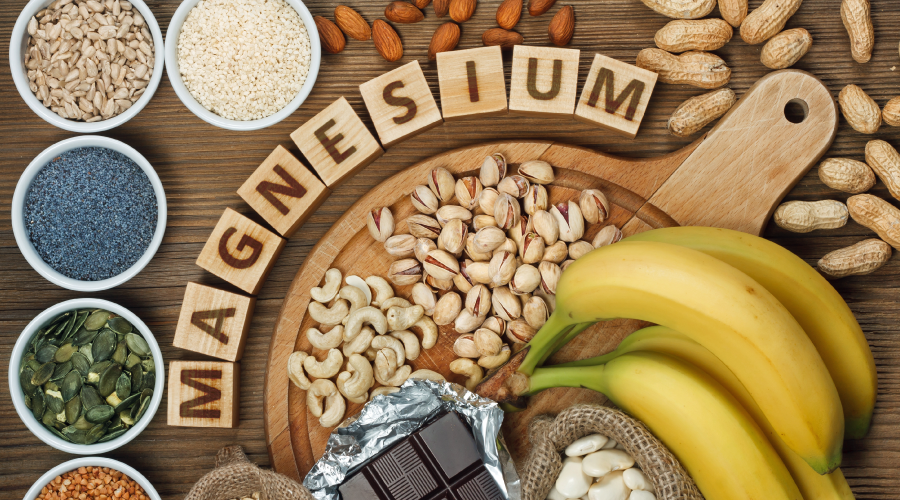

Magnesium is an essential mineral that supports more than 300 bodily functions. Along with many other things, it helps control mood, sleep, digestive health, metabolism, bone density, and headaches. It is believed that the majority of people do not consume enough magnesium through food. So, which form of magnesium is best? Let’s read further to find out!
Symptoms of Magnesium Deficiency
A deficiency of magnesium can cause the following symptoms:
- Insomnia or sleep disruption
- Anxiety/depression
- Muscle aches, cramps, or spasms
- Osteoporosis and joint discomfort
- Increased levels of tension
- Migraines
- Nausea/dizziness
- Elevated blood pressure
- Abnormal heartbeats
- Diabetes type 2
- Respiratory difficulties
- Fatigue
- Loss of memory or confusion
- Cramping before menses
Magnesium Deficiency Causes
Diet (too much of some foods and not enough of others), menopause, issues of the digestive system that impair absorption, type 2 diabetes, alcoholism, and some medications are the most common causes of magnesium insufficiency.
Which Form of Magnesium is Best?
Magnesium is available in eight forms. To determine which of these eight forms of magnesium is best for you, read through each of them.
1. Magnesium Chloride
Being water-soluble, magnesium chloride is a highly absorbable type of magnesium. By supporting drainage channels, it helps improve kidney health and metabolic functions. Those who have experienced a heart attack may potentially benefit from it.
2. Magnesium Sulphate
Magnesium sulphate, also referred to as Epsom salts, eases sore, achy muscles and facilitates the body’s drainage channels. According to other researchers, magnesium sulphate promotes heart health. This type of magnesium is used in numerous medications.
3. Magnesium Citrate
Magnesium citrate is a popular and efficient laxative. It is also advised for restless legs syndrome. However, some professionals caution that prolonged use can tamper with the levels of iron and copper in our bodies, resulting in health issues. It would probably be best to only use it occasionally to ease constipation.
4. Magnesium Oxide
Many multivitamins include magnesium oxide, a less expensive and less absorbable version of the mineral. Muscle aches and headaches are treated with it as a general magnesium supplement but it might not be as effective as other types. Magnesium oxide studies have produced a range of outcomes. A 2006 study discovered that it increased young girls’ bone mineral density.
5. Magnesium Glycinate
The health of the neurological system benefits greatly from this kind of magnesium. 10 uses of Magnesium glycinate are as follows:
- Lessening nerve pain
- Reducing anxiety
- Lessening stress
- Supporting gastrointestinal health
- Improving bone density
- Reducing irregular heartbeats
- Managing blood sugar which may reduce the chance of developing diabetes
- Improving muscular flexibility after injury
- Improving brain function
- Helping treat chronic pain
- Leg cramp relief (especially during pregnancy)
6. Magnesium Orotate
This supplement offers several advantages and is a very absorbable form of magnesium. Congestive heart failure and constipation have both been treated with magnesium orotate. Particularly in those with heart problems, it can boost endurance and exercise tolerance.
According to a 2017 study, taking a probiotic combined with prescription depression medication helped with depression and reduced its negative side-effects.
7. Magnesium L-threonate
This type of magnesium is highly absorbed, has the potential to cross the blood-brain barrier, and is thought to benefit brain function. It may also permeate cell membranes.
Motor impairments such as weakness in the arms and legs, lack of muscle control, or paralysis can occur in people with brain tumours and brain injury. Magnesium L-threonate, according to one study, boosted magnesium levels in cerebrospinal fluid, which reduced neuronal damage and corrected motor impairments. Those who have PTSD, anxiety, depression, or neurological diseases can benefit from this form of magnesium.
8. Magnesium Malate
Our body uses malic acid to produce energy. Interestingly, compared to magnesium orotate or citrate, this kind of magnesium has a significantly higher rate of absorption. Magnesium malate is beneficial for:
- Fatigue & improve energy
- Muscle pain
- Fibromyalgia
- Headache
- Migraine
- Constipation
- Heartburn
Foods Rich in Magnesium
Magnesium can be obtained in greater amounts via diet. Some of the best sources of magnesium dietary food are:
- Roasted pumpkin seeds, which provide 37% of the recommended requirement per ounce
- Chia seeds, which have a daily worth of 26% per ounce
- Almonds, which have a daily value of 19% per ounce
- Boiled spinach, which have a daily value of 19% per half cup
- Other top sources of this mineral are cashews, black beans, peanuts, and soy milk.
However, it is said that only about 30–40% of the dietary magnesium a person consumes is absorbed by the body. This could make it difficult for some individuals to consume enough of this mineral from their diet, especially given the dearth of foods that are high in magnesium.
What to be Mindful of When Choosing a Magnesium Product
It is crucial to think about the following while selecting magnesium products:
- How much magnesium a person already gets from their diet and whether they need a supplement or topical treatment
- How much more magnesium a person needs and whether topical or oral administration is better
The recommended daily amount (RDA) for magnesium in adults is 400–420 milligrams (mg) for males and 310–360 mg for females. During pregnancy and breastfeeding, a female’s RDA may increase to 400 mg per day. Note: pregnant females and breastfeeding mothers should take supplements under medical supervision
Conclusion
Your needs will determine the type of magnesium you require. For example, magnesium malate, orotate, or citrate would be your best pick if you’re trying to get rid of constipation. Magnesium glycinate and l-threonate are the ideal formulations for relieving stress and anxiety.
Magnesium needs to be taken in higher doses when we are deficient in restoring our levels to normal.




